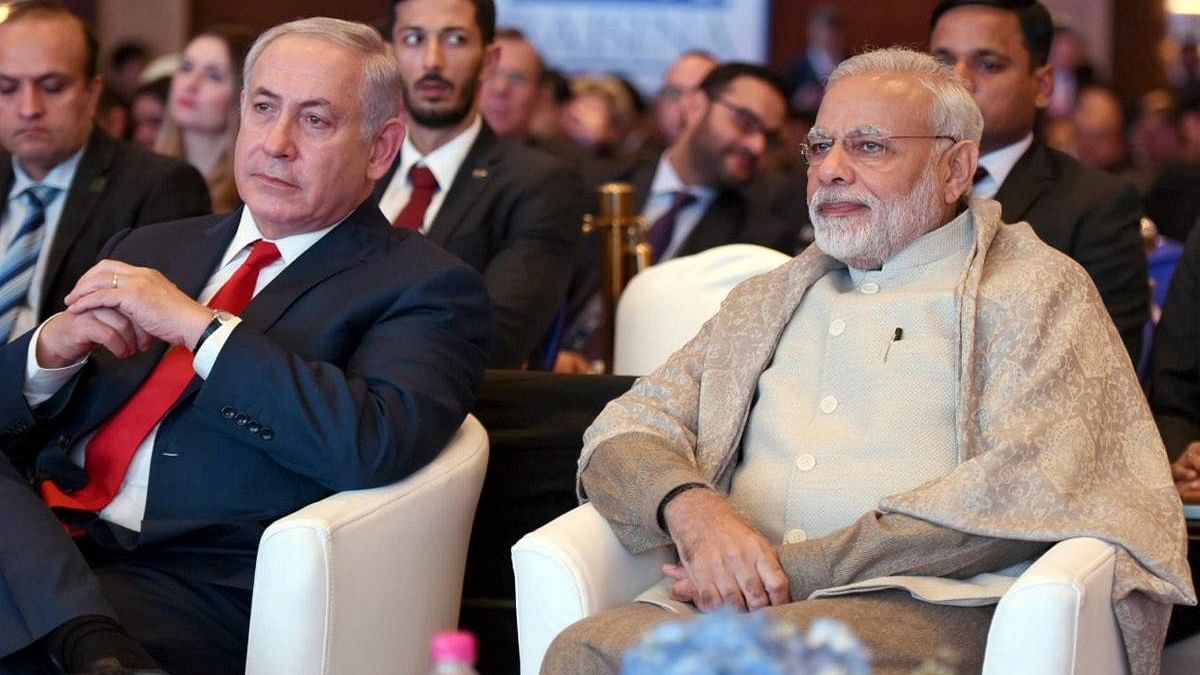
Prime Minister Narendra Modi with his Israeli counterpart Benjamin Netanyahu.
Credit: PTI File Photo
The prime ministers of India and Israel, Narendra Modi and Benjamin Netanyahu, discussed the safety of maritime traffic during a phone call on Tuesday – even as the Houthi militants based in Yemen continued targeting the commercial shipping vessels sailing through the Red Sea and the Suez Canal.
The two leaders spoke over the phone even as the Indian Navy deployed two guided missile destroyers – INS Kochi and INS Kolkata – off the coast of Aden amid continuing attacks on the oil tankers and cargo ships by the Houthis in the Red Sea. The United States too has mobilized a multinational naval force to respond to the attacks by the Houthis.
Netanyahu’s office claimed in a statement that he and Modi discussed “advancing the arrival of foreign workers from India to the State of Israel”. An official of the Israeli Builders Association was recently quoted in a report by Voice of America (VoA) stating that the organisation had asked Netanyahu’s government to discuss with New Delhi and speed up the arrival of at least 100,000 workers from India to Israel to replace the Palestinians in the construction sector. The move followed the October 7 attacks by Hamas terrorists in southern Israel and the retaliatory offensive by Israel in Gaza over the past two-and-a-half months.
V Muraleedharan, Minister of State for External Affairs, however, told Rajya Sabha on December 14 that the Government of India had not held any discussions with Israel regarding the possible replacement of Palestinian workers with Indians.
The Houthis have been carrying out drone and missile strikes on commercial vessels in the Bab-el-Mandab strait – the southern entrance to the Red Sea – in response to Israel’s aerial strikes and ground offensives in the Gaza Strip. The attacks prompted several shipping companies, like AP Moller-Maersk, MSC, CMA-CGM and Hapag-Lloyd, to pause container ship traffic through the Red Sea and Suez Canal. BP – the energy major of the UK – paused all shipments of oil and gas through the Red Sea too.
With the attacks by the Houthis, based in Yemen and allegedly backed by Iran, posing a threat to the global supply chain, the issue figured prominently during the phone call between Modi and Netanyahu. “Had a productive exchange of views with PM @netanyahu on the ongoing Israel-Hamas conflict, including shared concerns on the safety of maritime traffic,” Modi posted on X after speaking to Netanyahu.
“The two leaders discussed the importance of securing freedom of navigation in the Bab-el-Mandeb, which is threatened by the aggression of the Houthis, instigated by Iran,” stated the office of the prime minister of Israel.
The disruption in maritime traffic through the Red Sea and the Suez Canal has triggered concerns in New Delhi as the shipping route, connecting Asia and Europe and accounting for at least 12% of global trade, is important for India. The alternative route around the Cape of Good Hope may raise the shipping and insurance costs by 30% and result in delays of 10-20 days for cargo from India to be delivered to the destinations in Europe and vice versa.
Netanyahu’s office stated that he and Modi discussed the “global interest in preventing attacks on the global economy and trade as well as the Indian and Israeli economies”. Modi told Netanyahu that freedom of navigation was “an essential global necessity that must be ensured”, according to a statement issued by the office of the prime minister of Israel.
“Highlighted India’s consistent stand in favour of early restoration of peace & stability in the region with continued humanitarian assistance for the affected,” Modi posted on X after speaking to Netanyahu.
Netanyahu thanked Modi for India's support to “Israel's just war to eliminate the Hamas terrorist organization”.
